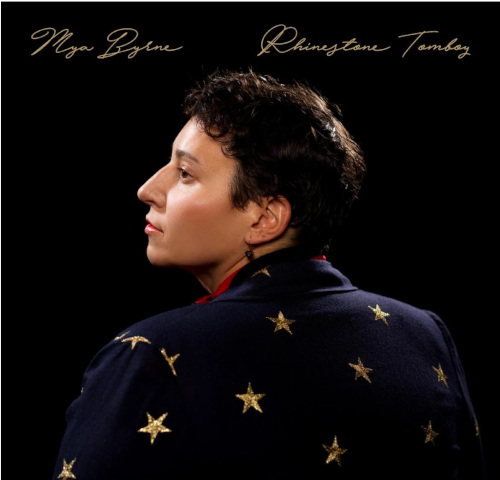Americana singer/songwriter Mya Byrne has lived through countless natural disasters, a global pandemic, and marginalization. A queer trans woman who has spent more than 20 years as part of various songwriter circles, Byrne channels this and much more on Rhinestone Tomboy, her debut for Kill Rock Stars Nashville, available now.
Videos by American Songwriter
Rhinestone Tomboy was produced by Grammy-nominated songwriter Aaron Lee Tasjan while Byrne wrote or co-wrote all 12 of the album’s tracks. Byrne, who has a Bachelor of Fine Arts degree with a concentration in poetics from The New School, says many of the songs featured on the project either started as poems or songwriting prompts.
While living in New York City in the early 2000s, Byrne was performing at an open mic night when someone slipped her a note. It was an invitation from Jack Hardy to the Songwriters Exchange, a weekly meetup Hardy had hosted since the 1970s where songwriters got together and workshopped their songs. It’s where artists like Suzanne Vega, John Gorka, and Shawn Colvin started.
“Over the next few years, I would proceed to get ripped apart,” Byrne tells American Songwriter with a laugh, “and I really learned how to write.”

Also, a student of jazz, Byrne was advised by Hardy to write songs without an instrument. Instead of being confined by an instrument, Hardy suggested she write to the beat of her feet. She took the advice to heart, as most of Rhinestone Tomboy was written while walking.
One of the oldest songs on the project is the soulful and rock-leaning “Don’t Hold Your Fire.” After studying poet Gary Snyder, the song came together when Byrne learned a writing prompt from her mentor Sharon Mesmer.
A student of Allen Ginsberg, Mesmer taught Byrne a writing exercise called “between the lines,” where you take a song or poem and follow the structure and inflection but put it in your own words. It was a similar exercise Byrne had done in high school, writing her own lyrics to the tunes of Jimi Hendrix, Stevie Wonder, and Tori Amos.
“I think pastiche is a really good way to learn songwriting,” Byrne notes.
Byrne wanted to write a love song about giving someone a second chance, and that’s how “Don’t Hold Your Fire” came to be. It’s also a song about someone who can’t fully give themselves to her.
“Part of being trans is that I was not able to give my full self to people for many years,” she reflects. “This song is not about me, but it certainly relates to the experience I’ve had.”
Both the somber, pandemic-inspired “Curtains” and the driving opening track “It Don’t Fade” were inspired by songwriting prompts from the Timmy Riordan-led Fearless Songwriter Challenge. The songwriters were given an Edward Hopper painting of a girl looking out the window to write about. Byrne says she wrote “It Don’t Fade” verbatim during the COVID-19 pandemic while walking around California.
“It’s one of the most humbling experiences of songwriting I’ve ever had,” she says. “I feel like that song was really given to me. It is about the pandemic when you’re stuck inside, in the stale air. [It] is also about the wildfires and my friends and I being stuck inside our houses and not being able to breathe.
“None of us knew what was going to happen and none of us knew if we’d have careers at the end of this. … This song [shows] we’re under so much stress, but the sun is still shining behind the clouds, and we have enough to give to each other and to meet each other halfway.”
But if your heart is in the right place
It don’t matter in the first place
Where you come from and where you are
Where songs like the captivating rock-tinged “Smoke and Bones” further detail the 2018 wildfire in Paradise, California, others channel the late songsmith John Prine. The punk-infused, guitar-driven “Come On” was written a week after Prine’s death in 2020 of complications caused by COVID-19.
“There are a couple of songs that are directly influenced by John Prine,” she says. “Not necessarily in sound, but definitely in content and intention. Ironically, the most punk song on the record, ‘Come On,’ is actually a John Prine tribute.”
A queer trans woman playing Americana music that fuses elements of country, blues, and rock, Byrne is aware of the hurdles she has in front of her but chooses to push forward and inspire others with her art.
“I am Americana, I am America,” she says. “I represent a huge portion of this country. I’m a songwriter, first and foremost. The social aspect is the reason I write songs. … It’s pretty obvious to me that trans stories are stories that are of importance but my presence as an artist of merit is helping other people find themselves within songwriting. That is one of the biggest gifts that I’ve been given and one of the biggest privileges I’ve been given.”
